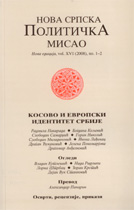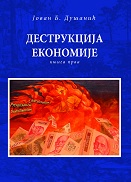| NSPM in English | |||
Good Neighbors? The Shanghai Cooperation Organization |
 |
 |
 |
| недеља, 21. март 2010. | |
|
(Carnegie Council for Ethics and International Affairs, 18.2.2010)
Over much of the first decade of SCO, the alliance has been treated dismissively in the West, seen as essentially an "anti-" force, a counterbalance to NATO's role and influence in the Central Asia region and to post-Cold War U.S. unilateralism in general—and not a particularly effective countermeasure to boot. In recent times, however, one may convincingly argue that the role and significance of SCO has defied the skeptics in the West. This is so for at least three reasons: 1. SCO may be seen as a kind of neighborhood watch over some of the world's most insecure places: in this regard, one need look no further than Afghanistan, which, since the first anti-Taliban offensive by NATO in 2001 (the year of SCO's founding) has become a principal source of regional instability for all SCO members, with the threat of cross-border terrorist activity and the very real issue of the opium trade. For the United States and NATO, the challenges posed by the Taliban and Al Qaeda in Afghanistan are those of a distant point of origin for attacks on the homeland; for the SCO Six, the threat is in the immediate neighborhood. 2. In 2004, SCO granted observer status to Mongolia. Since then, Iran, India, and Pakistan have similarly taken on the role of observer in SCO meetings. The term "observer" implies something considerably more substantive than viewing proceedings from the SCO gallery, and, as the New America Foundation expert Flynt Leverett has pointed out:
In 2005, SCO signed memoranda of understanding with the Association of South East Asian Nations (ASEAN) and with the Commonwealth of Independent (former Soviet) States. While in themselves mainly symbolic, these nonetheless speak to a growing SCO presence in an extended region of vital strategic importance. 3. The agenda has similarly, and decisively, expanded. EurasiaNet reported following the November 2008 SCO meeting in Astana, Kazakhstan, that: "As the global economic crisis continues, the SCO looks to promote financial stability to fight regional insecurity….[and] …to urge a shake-up of the global security and economic order." The whole theme of the Astana conference was the need to deal with security and economic development in tandem. Furthermore, as Flynt Leverett has noted, "the inclusion of Iran, India, and Pakistan as observers significantly expands the SCO's already considerable latent potential to exert influence over the development and marketing of Central Asia's oil and gas resources." According to a BP global energy survey in 2008, three of the SCO nations—Russia, Kazakhstan, and Uzbekistan—along with Iran hold almost 20 percent of the world's proven oil reserves and almost 40 percent of natural gas reserves. To dismiss SCO as some kind of empty anti-U.S., anti-NATO rhetorical flourish is, therefore, counterfactual. The expanded role and reach of the organization is demonstrable, impressive, and likely to continue. The new SCO Secretary-General, Muratbek S. Imanaliev, said in early February that there are two priority items for the alliance's consideration in 2010: first, "active contributions to the Afghanistan issue, including economic cooperation and energy support"; second, consideration of full membership for Iran and Pakistan. This latter issue, expansion of SCO membership, is an ironic mirror image of NATO expansion in the 1990s. Clearly, spreading the welcome mat to Iran in an alliance with so strong a say on Caspian and Central Asian energy resources would evoke similar indignation from Western capitals as NATO's eastward march did from Moscow. But the strategic considerations, from the SCO point of view, are at least as compelling as those that brought NATO to Russia's borders. In any event, the outcome is by no means resolved. In terms of the historical context, Russia has for some time pushed for Iran's full membership, and China has resisted. The resistance, however, has been vaguely articulated, and may be overtaken by other events. At a 2008 meeting with Iranian President Mahmoud Ahmedinejad, Chinese Premier Hu Jintao cautiously "welcomed Iran's interest [in accession to membership]." A BusinessWeek article of February 4, 2010 quoted Dr. Niu Jun, a professor at Peking University's School of International Relations. Said Dr. Niu: "If Iran joined, it would drastically change the original function of the SCOI, which was dealing with the terrorism threat with cooperation from China's neighboring countries. The joining of Iran would mean that the meaning of SCO has totally changed." Of course, as we have already argued, the original "meaning" of SCO has already changed. The consensus view is that Chinese reluctance to extend full membership to Iran is rooted in a concern that this would change the "meaning" of SCO in a very specific way—namely, the alliance would inevitably be seen as anti-American, given the grim state of American-Iranian relations. However, China's economic rise has been accompanied by an increasingly assertive stance on what it sees as its national interests, including a pushback on U.S. pressure to adopt a tougher stance on Iran. In addition, there have been some recent bumps in the road in U.S.-China relations, with the $6 billion in arms sales to Taiwan and our lecturing of the Chinese on matters from climate change to Internet policy. In the end, the politics of Iranian SCO membership are, to say the very least, complicated; but China may decide that, on balance, Iran's inclusion adds to rather than detracts from responses to economic and security challenges in an unruly extended region.1 The conclusion is that the SCO, far from an empty vessel, is a regional force to be reckoned with. This need not imply any kind of "back to the future" military conflict or confrontation. Indeed, it is ironic and perhaps encouraging that, according to the Financial Times of February 8, in an article titled "NATO calls for more global partners," it reports that "Anders Fogh Rasmussen, NATO secretary-general, yesterday called for the allies to engage more international partners, including China, Russia, India and the republics of Central Asia, in their efforts to defeat the Taliban in Afghanistan and stabilize the country." Mr. Rasmussen, whether explicitly or not, is in fact asking for NATO engagement with the SCO. 1 The fluidity of the situation concerning Iran's accession has been underscored by a recent cooling in Russian-Iranian relations, the most recent indication of which is Russia's delay in delivering advanced air defense missiles to Iran for what Moscow calls "technical reasons." http://www.cceia.org/resources/articles_papers_reports/0043.html |
Од истог аутора
Остали чланци у рубрици
- Playing With Fire in Ukraine
- Kosovo as a res extra commercium and the alchemy of colonization
- The Balkans XX years after NATO aggression: the case of the Republic of Srpska – past, present and future
- Из архиве - Remarks Before the Foreign Affairs Committee of the European Parliament
- Dysfunction in the Balkans - Can the Post-Yugoslav Settlement Survive?
- Serbia’s latest would-be savior is a modernizer, a strongman - or both
- Why the Ukraine Crisis Is the West’s Fault
- The Ghosts of World War I Circle over Ukraine
- Nato's action plan in Ukraine is right out of Dr Strangelove
- Why Yanukovych Said No to Europe

.jpg)








 The Shanghai Cooperation Organization (SCO) was formed in 2001 as the successor organization to the "Shanghai Five," established five years earlier primarily to resolve military tensions on the Sino-Soviet border. The "Five" consisted of the Soviet Union, China, Kazakhstan, Tajikistan, and Kyrgyzstan. With the formation of SCO, Uzbekistan was added and the mandate extended to include border disputes in general, joint strategies to address terrorism and separatist impulses, and increased economic cooperation, including the creation of special "economic border zones."
The Shanghai Cooperation Organization (SCO) was formed in 2001 as the successor organization to the "Shanghai Five," established five years earlier primarily to resolve military tensions on the Sino-Soviet border. The "Five" consisted of the Soviet Union, China, Kazakhstan, Tajikistan, and Kyrgyzstan. With the formation of SCO, Uzbekistan was added and the mandate extended to include border disputes in general, joint strategies to address terrorism and separatist impulses, and increased economic cooperation, including the creation of special "economic border zones."













